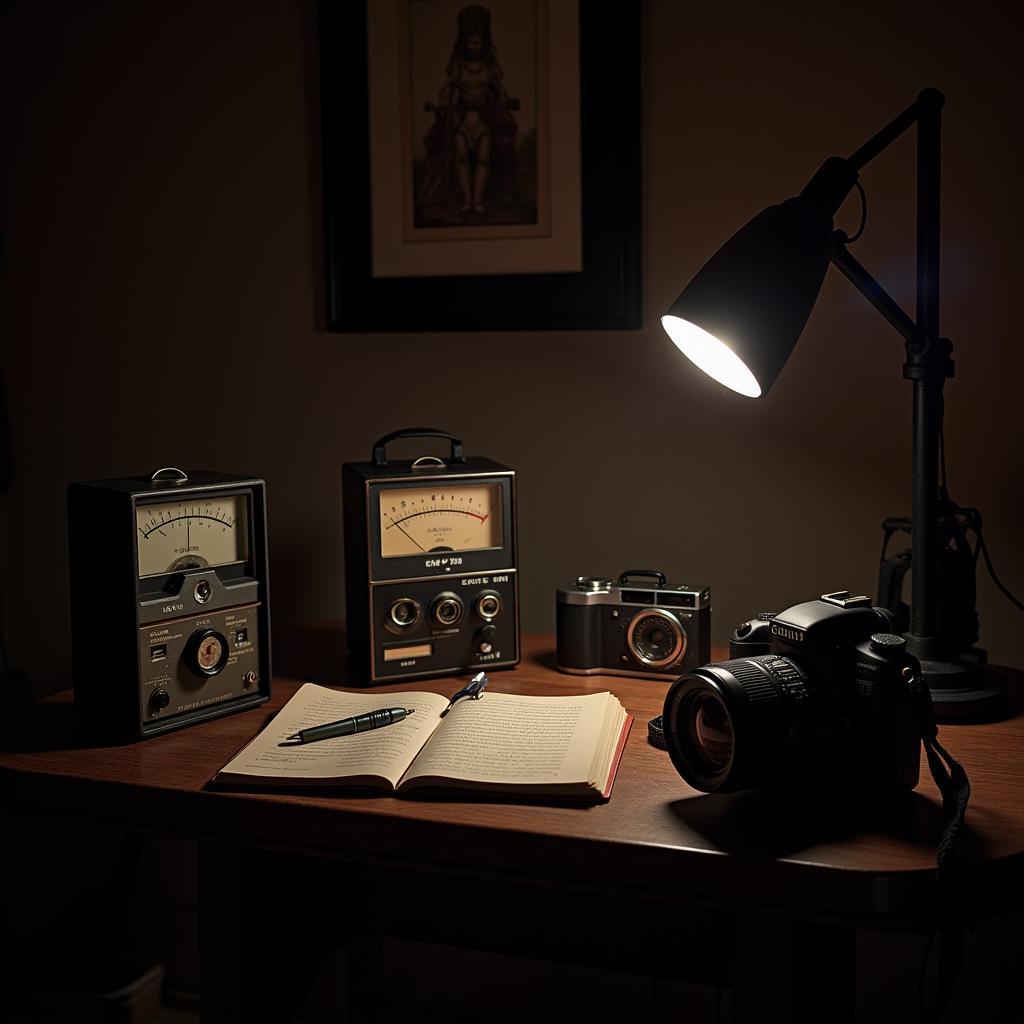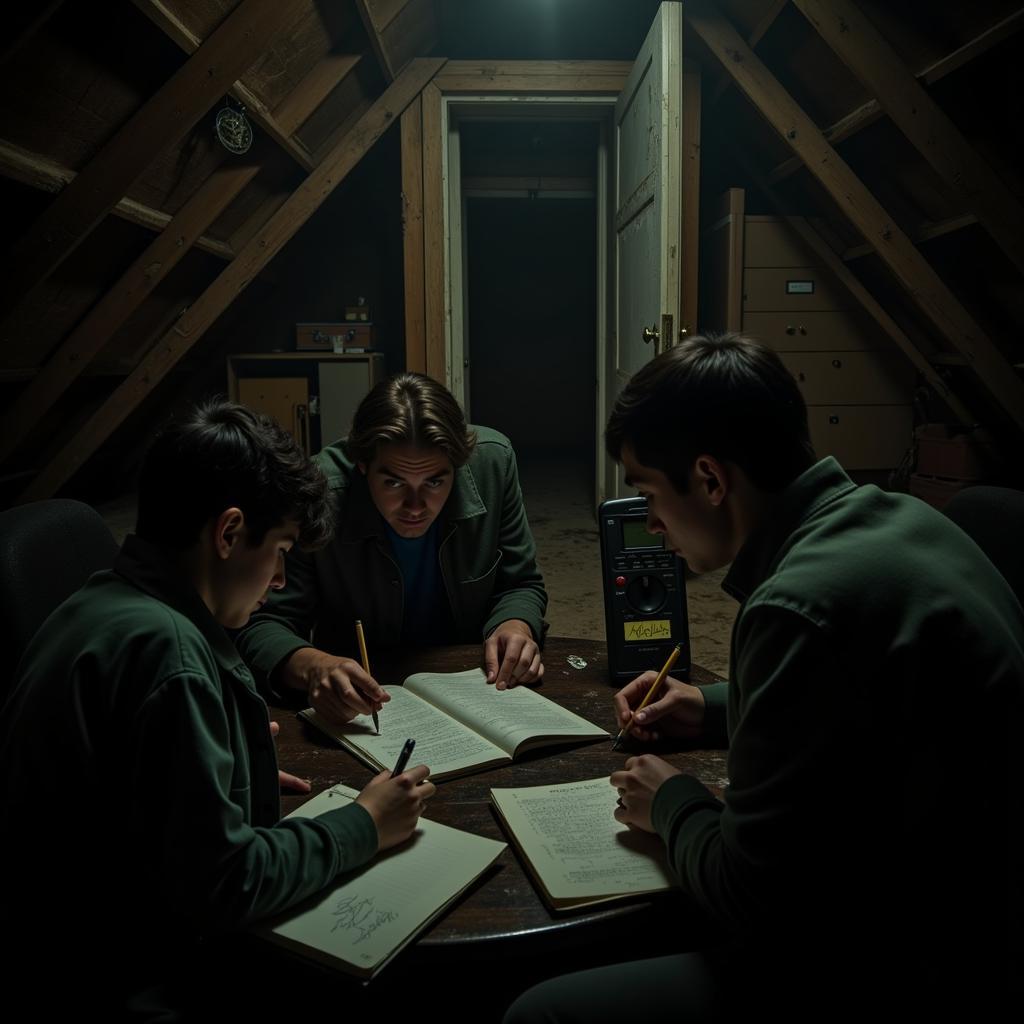Idr Research, a field shrouded in mystery and often misunderstood, delves into the depths of the unknown. This intriguing realm encompasses a wide range of phenomena that defy conventional explanations, captivating the human imagination for centuries. Whether you’re a seasoned paranormal enthusiast or a curious novice, this comprehensive guide will equip you with the knowledge and tools necessary to navigate the fascinating world of IDR research.
What Exactly is IDR Research?
IDR research encompasses the systematic investigation of unexplained occurrences, seeking to shed light on events that challenge our current understanding of the natural world. Unlike traditional scientific disciplines, IDR research ventures beyond the realm of the easily quantifiable, exploring experiences and phenomena that often resist conventional methods of observation and analysis.
The Scope of IDR Research
 Paranormal Investigation Tools
Paranormal Investigation Tools
From ghostly apparitions to unexplained energy surges, IDR research encompasses a diverse array of phenomena, including:
- Ghost Hunting: Investigating claims of hauntings, seeking evidence of spectral presences through a combination of sensory experiences, historical research, and technological tools like EMF meters and EVP recorders.
- Cryptology: Exploring the existence of creatures not yet recognized by mainstream science, such as Bigfoot, the Loch Ness Monster, and other cryptids, often relying on eyewitness accounts, footprint casts, and blurry photographs.
- Ufology: Studying unidentified flying objects (UFOs) and the possibility of extraterrestrial visitation, analyzing radar data, eyewitness reports, and photographic and video evidence of unusual aerial phenomena.
- Psychic Phenomena: Examining claims of extrasensory perception (ESP), telekinesis, and other abilities that suggest a connection beyond the five senses, often involving controlled experiments and statistical analysis.
The Methodology of IDR Research
 Paranormal Research Team in Action
Paranormal Research Team in Action
While IDR research may not always adhere to the rigid protocols of conventional science, it employs a systematic approach to gathering and analyzing evidence. Common methods include:
- Interviews: Gathering firsthand accounts from individuals who have experienced paranormal activity, paying close attention to details, emotional responses, and consistency in their narratives.
- Observations: Directly observing and documenting unusual phenomena, utilizing tools such as cameras, audio recorders, and EMF meters to capture evidence.
- Historical Research: Delving into the history of a location or phenomenon, searching for patterns, connections, and potential explanations rooted in the past.
- Experimentation: Conducting controlled experiments to test hypotheses and explore the potential mechanisms behind paranormal activity.
The Challenges of IDR Research
IDR research faces unique challenges, often encountering skepticism and criticism from those who adhere solely to conventional scientific paradigms. Some common obstacles include:
- Subjectivity: Experiences and interpretations can be influenced by personal beliefs, cultural backgrounds, and psychological factors, making it challenging to establish objective criteria for evaluation.
- Reproducibility: Paranormal phenomena are often spontaneous and unpredictable, making it difficult to replicate findings in controlled environments.
- Lack of Physical Evidence: Tangible proof often remains elusive, with researchers relying on anecdotal accounts, sensory experiences, and subjective interpretations of data.
The Importance of Skepticism and Open-Mindedness
IDR research thrives on a delicate balance between skepticism and open-mindedness. While it’s crucial to approach claims with a healthy dose of critical thinking, it’s equally important to remain open to the possibility that our current scientific understanding may not encompass the full spectrum of reality.
Delving Deeper: Resources for Continued Exploration
If you’re eager to delve further into the captivating world of IDR research, numerous resources are available:
- International Development Research Centre: international development research centre
- GR Research Crossover Upgrade: gr research crossover upgrade
Conclusion
IDR research invites us to explore the fringes of human knowledge, challenging our assumptions and expanding our understanding of the universe and our place within it. By embracing both skepticism and an open mind, we can continue to unravel the mysteries of the paranormal and shed light on the enigmatic forces that shape our world.
Frequently Asked Questions about IDR Research
1. Is IDR research the same as ghost hunting?
While ghost hunting is a popular area within IDR research, it represents just one facet of this expansive field. IDR research encompasses a wider range of phenomena beyond just ghosts, including cryptology, ufology, and psychic phenomena.
2. What qualifications do you need to be an IDR researcher?
There are no formal educational requirements to become an IDR researcher. However, a strong sense of curiosity, a passion for the unknown, and a willingness to learn and think critically are essential.
3. How can I get involved in IDR research?
Many local paranormal investigation groups welcome newcomers and offer opportunities to participate in investigations. You can also conduct your own research, starting with historical research or exploring unexplained events in your own area.
4. What are some of the most compelling pieces of evidence for paranormal activity?
Compelling evidence in IDR research often involves multiple forms of corroboration, such as eyewitness accounts aligning with EVP recordings or historical data supporting claims of hauntings.
5. Is IDR research dangerous?
Approached with respect and caution, IDR research is generally safe. However, it’s crucial to be aware of potential risks associated with exploring abandoned locations or engaging with unknown entities.
6. Where can I find reliable information about IDR research?
Reputable books, documentaries, and websites dedicated to paranormal research can provide valuable insights. Look for sources that prioritize evidence-based analysis and present information objectively.
7. What is the future of IDR research?
As technology advances and our understanding of consciousness expands, IDR research may continue to evolve, potentially uncovering new insights into the mysteries of the universe and the nature of reality itself.
Need Assistance with Your Own Paranormal Research?
Don’t hesitate to contact us! Our team of experienced Paranormal Researchers is here to provide guidance and support:
Phone: 0904826292
Email: research@gmail.com
Address: No. 31, Alley 142/7, P. Phú Viên, Bồ Đề, Long Biên, Hà Nội, Việt Nam.
Our dedicated customer support team is available 24/7 to assist you with any questions or concerns you may have.